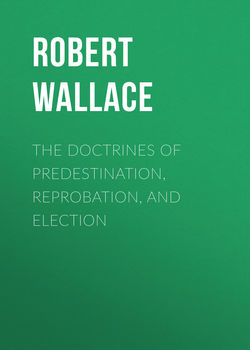Читать книгу The Doctrines of Predestination, Reprobation, and Election - Robert Wallace - Страница 4
PART I.—PREDESTINATION
CHAPTER I.
THE WORD PREDESTINATION, AND THE DOCTRINE AS HELD BY CALVINISTS
ОглавлениеTHE word “predestinate” signifies, according to the Imperial Dictionary, “to predetermine or foreordain,” “to appoint or ordain beforehand by an unchangeable purpose.” The noun, according to the same authority, denotes the act of decreeing or foreordaining events; the act of God, by which He hath from eternity unchangeably appointed or determined whatsoever comes to pass. It is used particularly in theology to denote the preordination of men to everlasting happiness or misery. The term is used four times in the New Testament, and comes from the Greek word proorizo, which signifies, “to determine beforehand,” “to predetermine” (Liddell and Scott). Robinson gives as its meaning, “to set bounds before,” “to predetermine,” “spoken of the eternal decrees and counsels of God.” According to the lexicographers, the meaning—as far as the word is concerned—is plain enough. It is quite clear from the Scriptures that God predestinates or foreordains. This is admitted on all sides. But here the questions arise—What is the nature of God’s predestination? and does it embrace all events? The Confession of Faith gives the following deliverance on the subject—“God from all eternity did, by the most wise and holy counsel of His own will, freely and unchangeably foreordain whatsoever comes to pass.” The Larger and Shorter Catechisms express the same idea. This was the opinion of the Westminster divines, and is the professed faith of Presbyterians in general in Scotland. One of the most eminent theologians of the school of Calvin—Dr. C. Hodge—vindicates this deliverance of the Assembly. He says, “The reason; therefore, why any event occurs, or that passes from the category of the possible into that of the actual, is that God has so decreed” (Vol. I., p. 531). He says again, “The Scriptures teach that sinful acts, as well as those which are holy, are foreordained” (Vol. I., p. 543). And, again, “The acts of the wicked in persecuting the early Church were ordained of God, as the means of the wider and more speedy proclamation of the Gospel” (Vol. I., p. 544). He says, moreover, “Whatever happens God intended should happen, that to Him nothing can be unexpected, and nothing contrary to His purposes” (Vol. II., p 335). The same writer, in speaking of the usage of the term “predestination,” remarks, “It may be used first in the general sense of foreordination. In this sense it has equal reference to all events, for God foreordains whatsoever comes to pass:” It will thus be seen that the Confession, and the Catechisms, and Hodge, as one of the most eminent expounders of these formularies, uphold the doctrine, that everything which happens was foreordained by God to happen. The doctrine as thus stated is clearly the foundation of the whole system of Calvinism. If this is shaken, the entire structure topples to its base. Being so important, its advocates have sought to strengthen it by appealing to the Divine attributes and to passages from holy writ. Let us then examine their arguments derived from the attributes, and the texts they have adduced.
